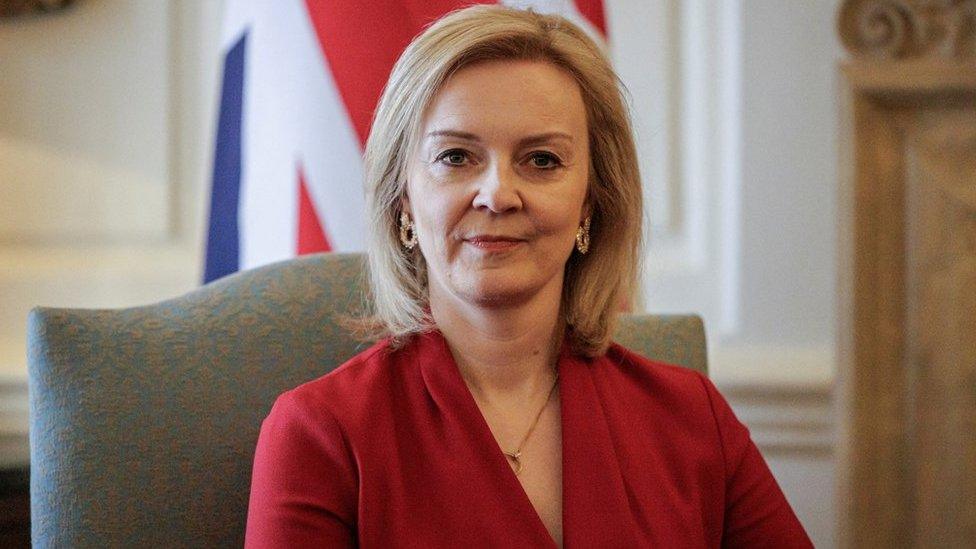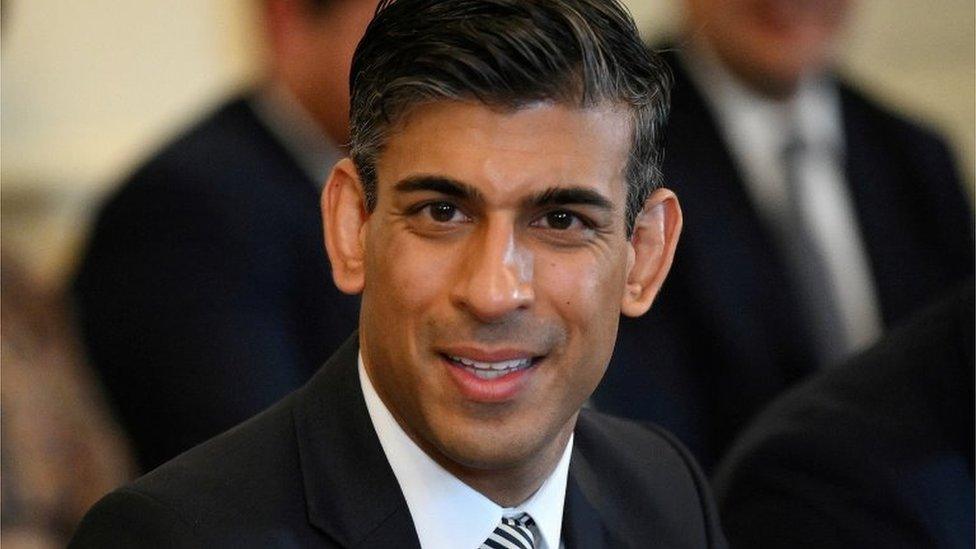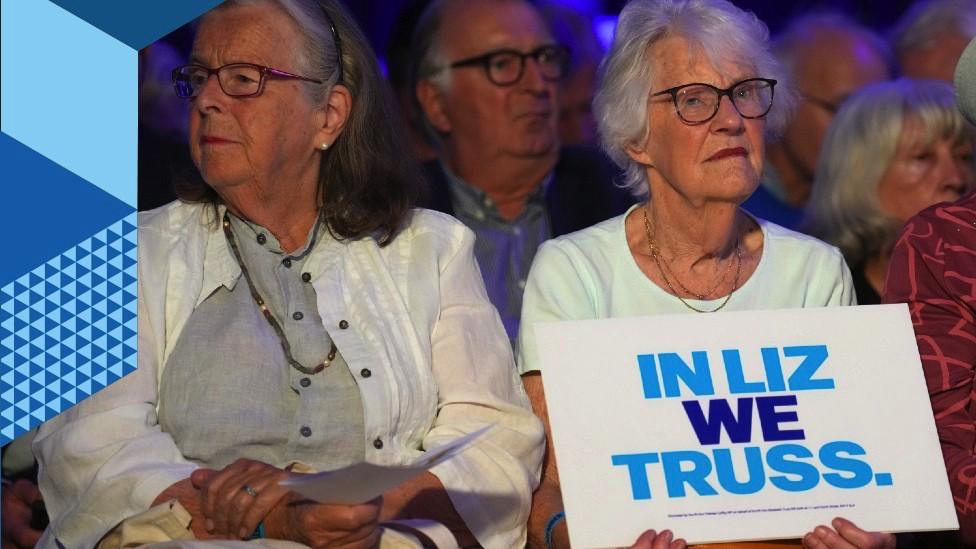Tory leadership: Do Liz Truss and Rishi Sunak's tax pledges add up?
- Published
- comments

One of the key areas of disagreement between the two candidates in the race to be prime minister - Rishi Sunak and Liz Truss - is tax.
The contest comes amid warnings from the Bank of England of a long recession later this year, and big expected increases in energy bills this winter.
Paul Johnson, director of the Institute for Fiscal Studies (IFS) economic think tank, said he was surprised not to be hearing more from the candidates about help for families.
"They're going to have to find many more billions to support households," he told BBC News.
"This is a much bigger increase in energy bills than was expected even a few months ago when the support packages were announced and that's not going to be helped by the sorts of tax cuts that are being talked about."
So, what are the tax cuts being promised?
Liz Truss
What has she pledged and how much would it cost?
scrap April's National Insurance rise: £13bn a year
cancel planned corporation tax rise: £17bn a year
temporarily suspend green levies on energy bills (she claims this would knock "around £150" off energy bills): £8.5bn a year
Total estimated cost: £38.5bn a year

National Insurance (NI) is a tax on earnings and self-employed profits - paid by all workers, until they reach the state pension age. It is also paid by employers.
Since April, they have been paying more in NI - an extra 1.25p in the pound. The rise - announced by Mr Sunak when he was chancellor - was initially to help the NHS clear its backlog and then to help fund social care.
To try to ease its impact, Mr Sunak then raised the threshold at which employees people start paying NI from £9,880 to £12,570 a year.
Reversing the NI rise would cost about £13bn a year, according to, external the IFS.
Corporation tax is a tax on the profits of businesses.
The tax rate is currently 19% but it is due to increase to 25% in April 2023.
The government estimates that cancelling this rise would cost £17bn a year.
However, the IFS points out that doesn't take into account whether lowering tax could lead to increased investment by companies.
"We would therefore expect the long-run cost to be considerably lower than £17bn a year," the IFS said, "though the effect would certainly not be big enough for the tax cut to pay for itself".
Ms Truss hopes that extra investment would stimulate growth, although that would be difficult because the Bank of England says there is not currently much spare capacity in the economy, which means there is not a lot of scope for the production of more goods and services.
Green levies
The government makes energy companies add an environmental and social element on to energy bills. This pays for things like schemes to help fund renewable energy and provide grants for insulation.
They make up about £153 of an average dual fuel bill, according to Ofgem.
In 2020-21, the levies raised £12.2bn, of which about 70% (£8.5bn) went on environmental programmes.
Ms Truss has said she is still committed to the net zero target, so is likely to have to fund the projects another way.
Analysis
There is little detail of how Ms Truss would fund all this, although she has said that she wants to pay off the government's Covid debt more slowly.
Her team said that up to £8.8bn a year could be saved by paying public sector workers different amounts depending on where they were based, but she quickly abandoned the policy after widespread criticism.
In the BBC debate, she said that her tax cuts could be paid for because: "There is already headroom of approximately £30bn in the budget."
The headroom is the amount of money the Office for Budget Responsibility (OBR) estimated in March that the government could spend without breaking its own borrowing rules.
But the IFS said that changes since March, with the economy now expected to go into recession, meant this £30bn figure was now "massively out of date".
On the prospect of a recession later this year, Ms Truss said: "What the Bank of England have said... is of course extremely worrying, but it is not inevitable. We can change the outcome and we can make it more likely that the economy grows."
Paul Johnson said: "I think we're going to struggle to avoid a recession and certainly you're not going to avoid a recession by doing what she seems to be suggesting, which is big tax cuts. That's more likely to stimulate inflation and create a bigger recession later on."

Rishi Sunak
What has he pledged and how much would it cost?
Reduce VAT on domestic energy bills from 5% to zero: £4.3bn a year
Cut 3p off income tax by late 2029: about £19bn a year
Mr Sunak was chancellor until 5 July (when he resigned), so announcing wholesale changes to his own policies could be seen as politically problematic.
He launched his leadership bid saying: "Once we have gripped inflation, I will get the tax burden down. It is a question of 'when', not 'if'."
The OBR said in March that on current plans, by 2026-27 the UK's overall tax burden would be at its highest level since the late 1940s.
VAT on energy
Mr Sunak has promised to cut the rate of VAT on domestic fuel bills from 5% to zero for one year from October, if average bills rise above £3,000 a year.
At the moment, VAT costs £94 of an average bill. Mr Sunak claim his measure will save an average household £160 - although clearly it depends on how much the energy price cap rises by.
The cost of the policy would be about £4.3bn for the year, depending again on how much prices rise.
In May, Mr Sunak rejected the idea of a VAT cut, saying in Parliament: "A flat rate payment has the benefit of being more progressive than VAT, which obviously gives very high, or higher, tax discounts to those who are particularly wealthy or have large houses and energy bills."
As Chancellor, he announced that all households in England, Scotland and Wales would receive £400 towards their fuel bills between October and March.
Cutting income tax
When he was chancellor, Mr Sunak announced that income tax would come down from 20p in the pound to 19p - in April 2024.
He has now said he will cut another 3p in the pound by the end of the next Parliament, expected to be by the end of 2029.
That's likely to cost in the region of £19bn a year.
"This is a very substantial tax cut," the IFS said.
"But it is still considerably smaller than the net tax rise announced by Mr Sunak as Chancellor, which was comfortably more than twice as large."
Mr Sunak said that it would be funded by a combination of growth in the economy and lower spending, promising not to increase debt to fund the tax cut.
He has not specified where the cuts in spending would be.
He plans to go ahead with increases to corporation tax, but says he is planning to bring in ways to make it cheaper for companies to invest at the same time.

Related topics
- Published5 September 2022
